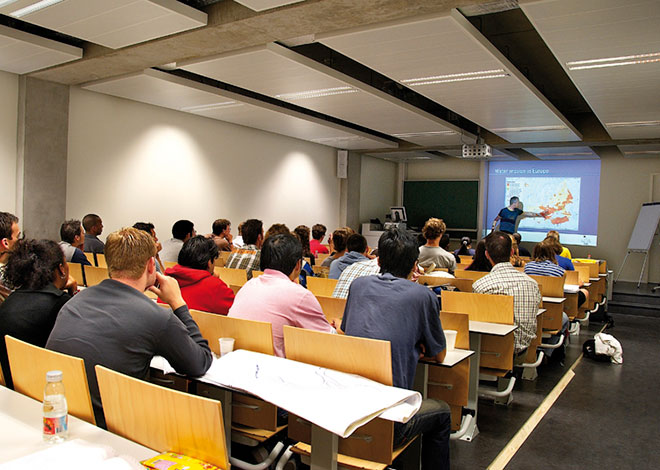Prevent study stress and earn credit points
Hurray! You’ve finished secondary school? Time to enjoy this glorious summer… Is your child going to start studying in September? If so, it is good to be aware of the risk of study stress. An increasing number of students suffer from this kind of stress. Studying can be fun and educational, but it also requires hard work. The first academic year revolves around earning enough credit points. As a parent, it is important that you have a good handle on how the credit point system works. This way, you can offer your child better advice if something goes wrong. To prevent study stress and earn credit points is something you would wish upon every first-year student. (in het Nederlands, Dutch version)

Prevent study stress and earn credit points. Do you know everything you need to about credit points? If so, you can then advise your child if something goes wrong. It is crucial in the first academic year to prevent study stress and earn credit points.
What are credit points?
Credit points are a unit of calculation. Every credit point you obtain is equal to 28 hours of study. If you have a course that takes one and a half weeks (56 study hours), you will earn 2 credit points. If you have completed a large course of, for instance, 280 study hours, you will receive 10 credit points. Of course, the university or university of applied sciences also wants proof that you have worked well during those hours. Thus, a course is usually concluded with an exam or report. If you pass this satisfactorily, you will be awarded the credit points. Otherwise not. Prevent study stress and earn credit points… if you have not earned enough credit points, you have a real problem.
An academic year consists of 60 credit points
An academic year consists of 60 credit points. If your study programme lasts three years, you have to earn 3×60 = 180 credit points. Your study programme is then complete. A student typically has different courses in such an academic year. Sometimes a part is self-study, sometimes a portion involves a lecture and at other times it includes doing an internship or excursion. The way the credit points are earned is different at each institution. It is also possible that a student’s work load in the first year is largely composed of lectures and self-study, while, in the third year, there is an internship or practical course, for example. (Read all about credit points)
Binding study recommendation
In the first academic year, students receive a Binding Study Advice (BSA). You must achieve a minimum number of credit points in your first year of study. If you do not manage this, you must quit the study programme. You cannot take the same study programme at the same institute in the next three years.
Some institutions require relatively few credit points, others a significant number. This varies from programme to programme. (Read all about the Binding Study Advice) The risk of not obtaining your BSA is very stressful. In such situations, it is not that easy to prevent study stress and earn credit points.
The first academic year
The first academic year often involves a lot of ‘perseverance’. This year usually consists of basic courses. A first academic year is not always fun. The interesting research, internships and practical courses which students heard about at the Open Day usually come later in the study programme. This could lead to frustration. A student who is confident about his/her abilities, will have less trouble with the first academic year.
Important to feel at home
This is also why it is important that the student feels at home in the university or university of applied sciences. The atmosphere must appeal to him/her. As a parent, it is important to inquire about this aspect. Your conversations should not only be about exams and credit points, but also ask about your child’s well-being. Does he/she feel at ease with fellow students? And with the lecturers? Does he/she know who his/her study adviser or study mentor is? You will need these people in times of adversity. To prevent study stress and earn credit points, you sometimes have to ask for help in time.
Failing to earn enough credit points
Once you have a Binding Study Advice, you may continue the study programme. If a student does not pass a course, he/she can just retake it. Of course, you will then have a study delay. The student will then spend a little longer on his/her study programme. This does not have to be a major issue. However, it is crucial that a student does not take year upon year to complete the degree programme. After a certain time, the credit points will ‘expire’. And that too is sure to cause stress.
Prevent study stress and earn credit points
Earning credit points is very important. But, as a parent, you should also put them into perspective. Some students simply need a bit of time to get used to their new student life. You can help with that too. Don’t put too much pressure on your child. Does your child have a room? Be sure to visit. Plan your visit carefully. It is not wise to visit unannounced. Most students really need a few days to make their room presentable.

Enjoy and support your child
Have you just received the news that your child has graduated secondary school this summer? Congratulations! Enjoy this moment and enjoy the phase that is coming now.
Will your child start studying? Then allow your student to enjoy a period with as little study stress as possible and earn the needed credit points… learn a lot; about yourself, about the world. Discover interesting disciplines. You will now prepare yourself for a career that gives you satisfaction… As a parent, you can positively influence this process. And you can enjoy it as a parent as well. Do not put too much pressure on your child. Enjoy this new phase of life and be there for your child, with all your wisdom – if/when your child needs you.
Five tips for parents of students regarding study stress
Tip 1 prevent study stress… learn to choose what really suits you
Tip 2 prevent study stress… don’t drive yourself crazy
Tip 3 prevent study stress… seek help
Tip 4 prevent study stress and educate yourself about study success
Tip 5 prevent study stress and earn credit points
Why these tips?
An increasing number of students suffer from stress. It can be tough. Student psychologists, student deans, student doctors, study advisers and study mentors regularly offer advice for preventing study stress. You can also find advice on this blog. Based on these recommendations, I have written five tips for parents. Of course, the student is full grown and is personally responsible for his/her progress and well-being. But it’s nice if parents lend a little support. So Tip 5 is prevent study stress and earn credit points.

